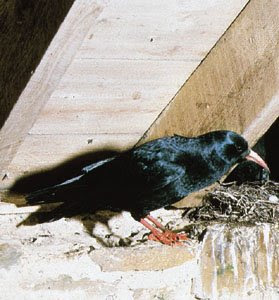
I've been musing about how words translate (or not) between Welsh and English - and how different the literal meanings are. One of my interests is wildlife and so I have found myself looking up the Welsh names of animals and birds especially. Sometimes they are close to the English, (Like blackbird) but at other times they are interestingly different. So, like in Ennglish, some of the names are descriptive -but focus on a different kind of description - hence Oystercatcher becomes Pioden y mor; (sea magpie) and thrush is Bronfraith (which I think is speckled breast) and the chough (where does that word come from??) becomes Bran coed goch - nicely straightforward as this means crow with red legs! (which can be seen in the picture and are much more common in Wales than in England).
Then there are words or phrases that are much more concise than in English in two senses. A) in the sense that there is one Welsh word for several in English. Examples here are – betws (grove of birch trees, so one dictionary says); echddoe – day before yesterday; echnos (night before last) . Quite helpful to have one word for this I think. And b) a kind of conciseness where one word is used where there are two in Englishb – e.g. dysgu (teach and learn) or menthyg (lend and borrow) and the precise meaning is worked out from the sentence . (and the marks of these can be seen in Welsh speakers who often use lend or borrow for either – not surprisingly)
Then there are words or phrases that are much more concise than in English in two senses. A) in the sense that there is one Welsh word for several in English. Examples here are – betws (grove of birch trees, so one dictionary says); echddoe – day before yesterday; echnos (night before last) . Quite helpful to have one word for this I think. And b) a kind of conciseness where one word is used where there are two in Englishb – e.g. dysgu (teach and learn) or menthyg (lend and borrow) and the precise meaning is worked out from the sentence . (and the marks of these can be seen in Welsh speakers who often use lend or borrow for either – not surprisingly)
Then there are also just interesting and fascinating words or phrases. I was watching a countryside programme and wondered what the reference to ceffyl wedd meant literally - it was clearly what we would call a heavy or work horse, and it turnns out that wedd means yoke - so it means yoke horse. Annd there are so many words for toad that I don't know which if any is the most commonly used. I don't remember the word from our childhood - we probably used llyffant (frog) for both - but apparantely toad can be "llyfant dafad" which initially looks like it is a sheep frog - but further enquiries reveal that dafad also means warty - so that makes sense

No comments:
Post a Comment